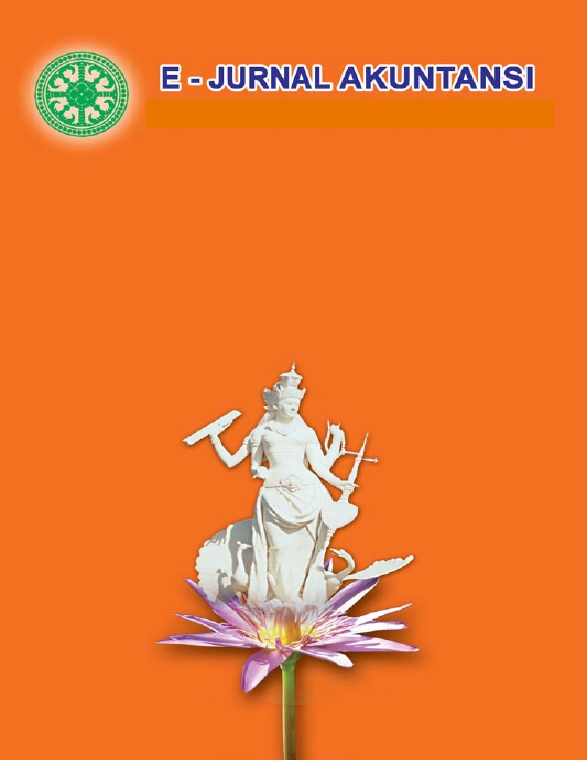Motivasi, Lingkungan Keluarga, Biaya Pendidikan, Peluang Kerja dan Minat Mahasiswa Melanjutkan PPAk
Abstract
The research objective was to obtain empirical evidence of the influence of motivation, family environment, educational costs, and job opportunities on the interest of S1 Accounting Students to continue Accounting Professional Education (PPAk). This research was conducted at the Faculty of Economics and Business, Udayana University. The number of samples used was 67 samples, with the nonprobability sampling method using purposive sampling technique. Data collection was carried out using a questionnaire. The analysis technique used is multiple linear regression analysis technique. The results of the analysis found that career motivation was positively related to students' interest in continuing PPAk; economic motivation is positively related to students' interest in continuing PPAk; family environment has a positive effect on students' interest in continuing PPAk; education costs have a negative effect on students' interest in continuing PPAk; and job opportunities have a positive effect on students' interest in continuing PPAk.
Keywords: Motivation; Family environment; Cost of education; Job Opportunities; Student Interest
Downloads
References
Berlinasari, M., & Erawati, N. M. A. (2017). Pengaruh Motivasi, Biaya Pendidikan dan Lama Pendidikan pada Minat Mahasiswa Akuntansi Mengikuti PPAk. E-Jurnal Akuntansi, 21(1), 447–476.
Dibabe, T. M., Wubie, A. W., & Wondmagegn, G. A. (2015). Factors that Affect Students’ Career Choice in Accounting: A Case of Bahir Dar University Students. Research Journal of Finance and Accounting, 6(5), 146–153.
Dyastari, N. P. S., & Yadnyana, I. K. (2016). Pengaruh Motivasi Pada Minat Mahasiswa Non Akuntansi Untuk Mengikuti Pendidikan Profesi Akuntansi. E-Jurnal Akuntansi Universitas Udayana, 16(1), 333–361.
Hsiao, J., & De Castro Casa Nova, S. P. (2016). Generational approach to Factors Influencing Career Choice in Accounting. Revista Contabilidade e Financas, 27(72), 393–407.
Husin, S. (2015). Pengaruh Motivasi Kualitas Dan Motivasi Ekonomi Terhadap Minat Mahasiswa Akuntansi Untuk Mengikuti Pendidikan Profesi Akuntansi (PPAk) dengan Kepribadian Individu Sebagai Variabel Moderating (Studi Empiris pada Mahasiswa Akuntansi Fakultas Ekonomi Univers. Jom Fekon, 2(1), 1–15.
Kurniawan, J., Effendi, Z. M., & Dwita, S. (2018). The Effect of School Environment, Family Environment and Learning Motivation on Students’ Learning Performance. Atlantis Press, 57, 571–576.
Mardi, & Kurniawati, H. (2014). Pengaruh Motivasi Kualitas, Karier, Ekonomi dan Sosial Terhadap Minat Mahasiswa Akuntansi Mengikuti Pendidikan Profesi Akuntansi (PPA/PPAk.). Jurnal Keuangan Dan Perbankan, 10(2), 47–63.
Marta Permana, I. M. B. A., & Suartana, I. W. (2018). Pengaruh Motivasi Kualitas, Motivasi Karir, Motivasi Ekonomi, Motivasi Sosial, Biaya Pendidikan pada Minat Mengikuti PPAk. E-Jurnal Akuntansi, 25(1), 214–240.
Paramesti Ningrat, I. A. A., & Krisna Dewi, L. G. (2020). Pengaruh Motivasi, Lingkungan Keluarga, Biaya Pendidikan pada Minat Mahasiswa Mengikuti Pendidikan Profesi Akuntansi. E-Jurnal Akuntansi, 30(7), 1684–1698.
Sapitri, S., & Yaya, R. (2015). Faktor-Faktor Yang Berpengaruh Terhadap Minat Mahasiswa Untuk Mengikuti Pendidikan Profesi Akuntansi (PPAk). Jurnal Akuntansi & Investasi, 16(1), 46–61.
Sari, L. K. (2016). Pengaruh Nilai Intrinsik Pekerjaan, Lingkungan Kerja, dan Pertimbangan Pasar Kerja Terhadap Motivasi Pemilihan Karier Sebagai Akuntan. Skripsi, June.
Sari, M. D. (2015). Pengaruh Motivasi, Persepsi Dan Pertimbangan Pasar Kerja Terhadap Minat Mahasiswa Akuntansi PPAk Dalam Pemilihan Karir Sebagai Akuntan Publik. Jom FEKON, 2(2), 1–14.
Vesperalis, A. A. A. D., & RM, K. M. (2017). Pengaruh Motivasi Pada Minat Sarjana Akuntansi Universitas Udayana Untuk Mengikuti Ppak. E-Jurnal Akuntansi, 19(2), 1691–1718.
Yudhantoko, M. B. (2013). Persepsi Mahasiswa Akuntansi Mengenai Minat dalam Pemilihan Karir sebagai Akuntan Perusahaan. Skripsi Sarjana Ekonomi Universitas Dipenogoro.

This work is licensed under a Creative Commons Attribution-ShareAlike 4.0 International License.

















